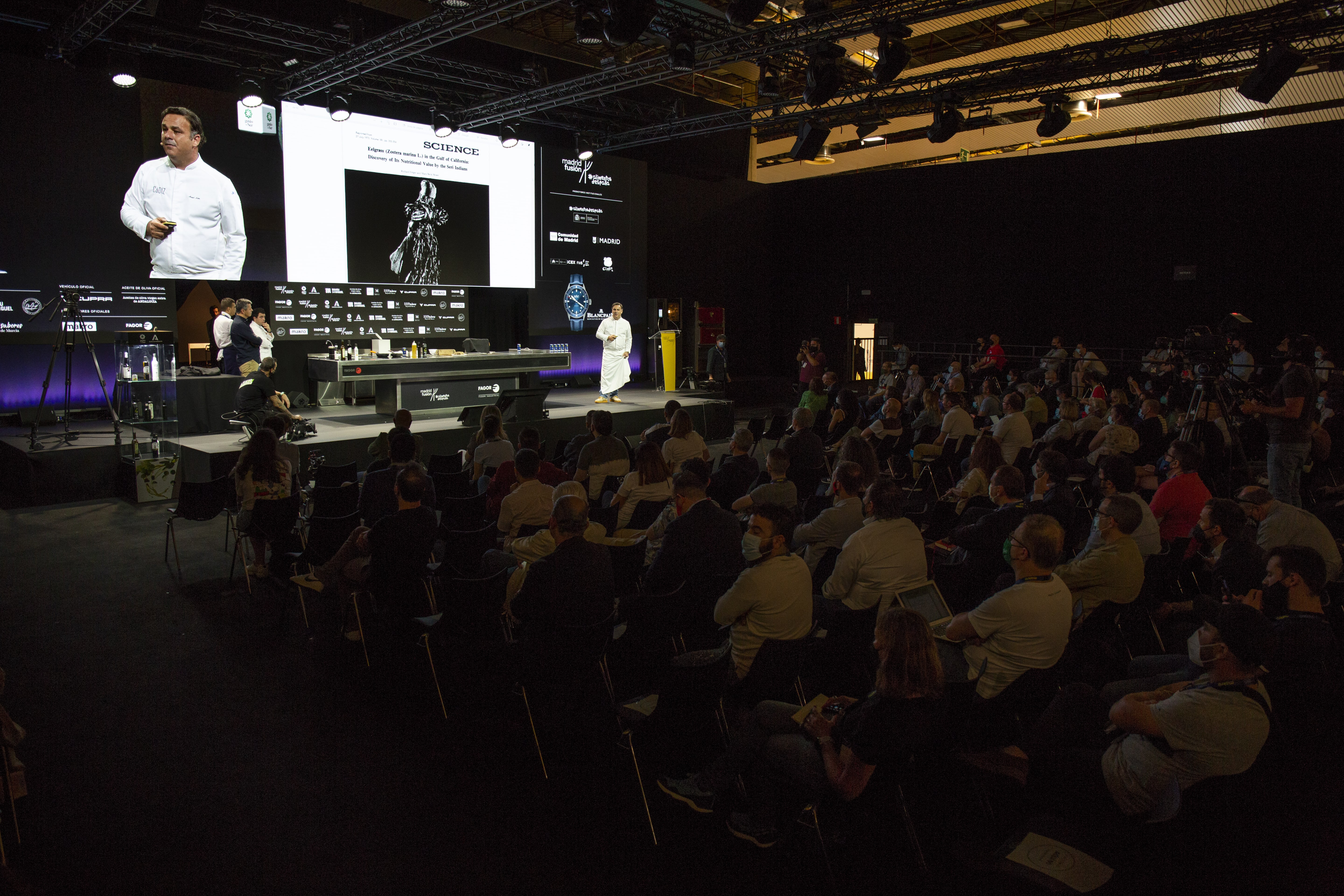
Last week, Madrid Fusión, among the world’s leading gastronomy conferences, celebrated its 19thedition, welcoming 15,000 delegates in person, 183 exhibiting companies and chefs from across the world.
This year’s event was a genuinely global affair, as the hybrid model allowed viewers from around the world to watch the full programme, which was streamed from the auditorium in Madrid’s Ifema exhibition centre.
After a year like no other, the conference was never going to be the same as in previous years – capacity in the main auditorium was capped at half the usual capacity and adhering to Covid regulations applied elsewhere across Madrid, meant face masks were required – but organisers Vocento Gastronomia took advantage of the situation to reinvent the congress and presented an engaging programme.
Seeing the world as new
Under the banner of circular gastronomy, chefs shared their solutions for a better and more responsible future in a post-pandemic world. The re-opening, after a long period of closure was seen as an opportunity to re-think, as presented by Andoni Luis Aduriz, the owner of Avant Garde restaurant Mugaritz. His 2021 menu, entitled The first time, is the result of his musings during lockdown and an attempt to look at everything again as if it were for the very first time.
“Everything is different,” he said. “It is my wish that we can start to look at the world again in a new and different way.”
A positive impact
Mauro Colagreco of Mirazur restaurant in the south of France, currently ranked the world’s best, presented his new menu, guided by biodynamic principles and inspired by the lunar cycles. The concept, conceived during the long period of lockdown last year when he spent most of his time working the vegetable garden, means that guests book for one of four menus: leaf, root, flower or fruit depending on the position of the moon and the restaurant changes the menu up to four times a week.
“As chefs we have an opportunity to have a positive impact on the environment; we can raise awareness and I believe this is an important time to take care of life. This is what the planet needs and it is what future generations after us are demanding,” he said. “This is why I say that the future is today. Nature is at the core of our kitchen, we should be respecting its life cycles and we must never lose sight of this.”
Ángel Leon, the chef of Aponiente in Cadiz and pioneer of marine exploration, chose Madrid Fusión as the stage to unveil the result from his latest investigation, the marine grain. Working with a team of marine biologists Leon has uncovered the cereal, found in the sea grass zostera marine, that has the potential to be cultivated and serve as a solution to food poverty while recovering biodiversity.
From Spain to the world
Elsewhere Spanish chef Rodrigo de la Calle outlined his 20 year mission to promote a plant forward approach to his kitchen and chef prodigy Flynn McGarry shared his innovative take on the use of vegetables in his New York City restaurant Gem, on stage in Madrid.
Joining via video link, Joshua Niland demonstrated the fish butchery that he has pioneered from his Sydney restaurant Saint Peter while Asia’s best female chef DeAille Tam, from restaurant Obscura in Shanghai described how she used the local ingredients from the small producers she had met on her travels around China.
The conference was also an opportunity to learn how the non-profit organisation World Central Kitchen (WCK) had rapidly set up a Spanish operation in the early stages of the pandemic. Javier García from WCK outlined how the team had engaged chefs whose restaurants were closed to feed people in need.
Putting people first
While all of the chefs have carved a path of sustainable practices in the kitchen, pioneering an environmentally responsible approach and being mindful of elements such as energy efficiency and food waste, many chose to turn the focus on the human factor.
Diego Rossi who travelled to Madrid to speak about his modern take on the Italian trattoria Trippa in Milan has implemented a strict eight-hour work day. “When we talk about sustainability we must talk about human sustainability,” he said. “I understand that my team have a life and this way they work better. If we spend 18 hours in the kitchen we can’t think about what we are doing, we don’t know what we are doing.”
And Joan Roca, the head chef of El Celler de Can Roca spoke of his hope that the end of the pandemic won’t mean a return to business as usual. The curfew imposed on hospitality during Covid, meant guests had dinner earlier and the restaurant team finished the work day earlier too. He hoped to challenge the convention of traditionally later dinners in Spain and said the restaurant would continue to ask diners to reserve earlier.
“During the pandemic our guests had to eat dinner early and now we are going to continue with this schedule to give our staff a chance to have a better quality of life.”
His brother Josep, the sommelier and front of house director at El Celler de Can Roca, added to this by reflecting on the importance of emotion in the dining experience, as he outlined the initiatives his team have launched to create a better environment.“Looking after the team is the best kind of investment a restaurant can make,” he said.
On its return, Madrid Fusión offered a hopeful view of the future of gastronomy bringing to the fore a clear perspective of reinvention and reflection.
Madrid Fusión will return in January 2022 with its 20thedition.
Tina Nielsen
